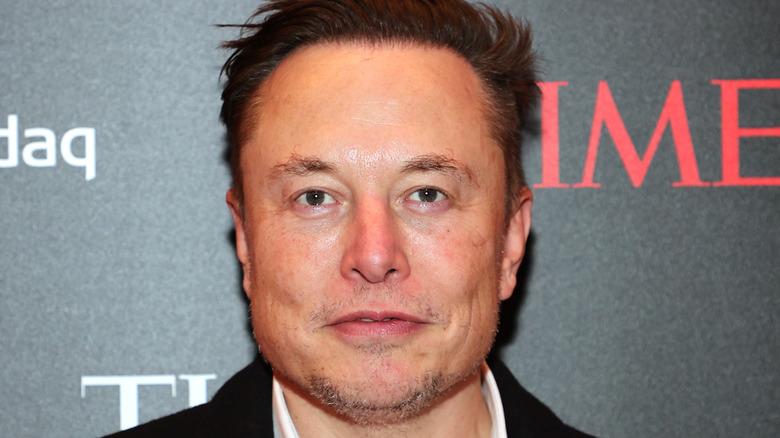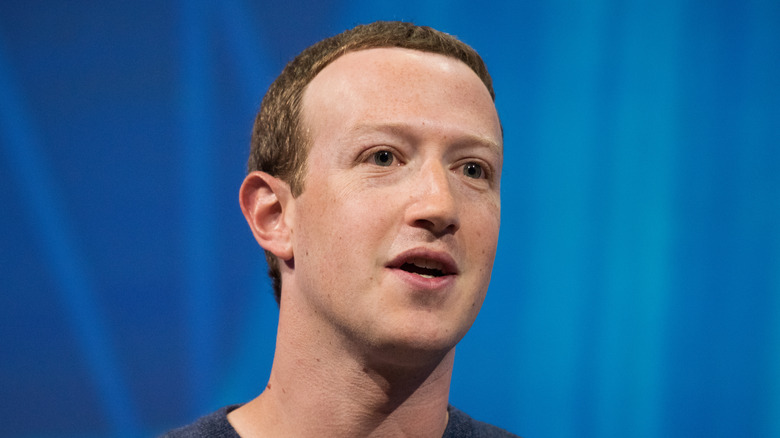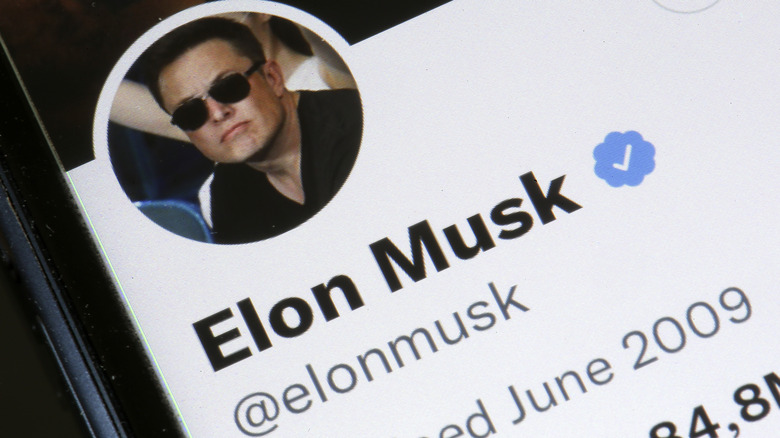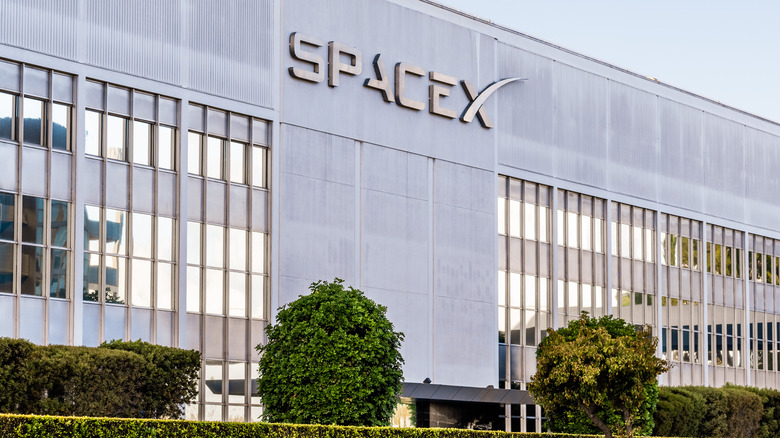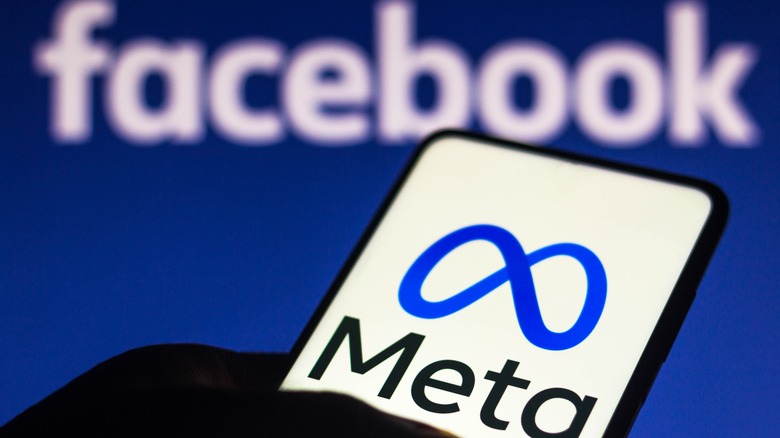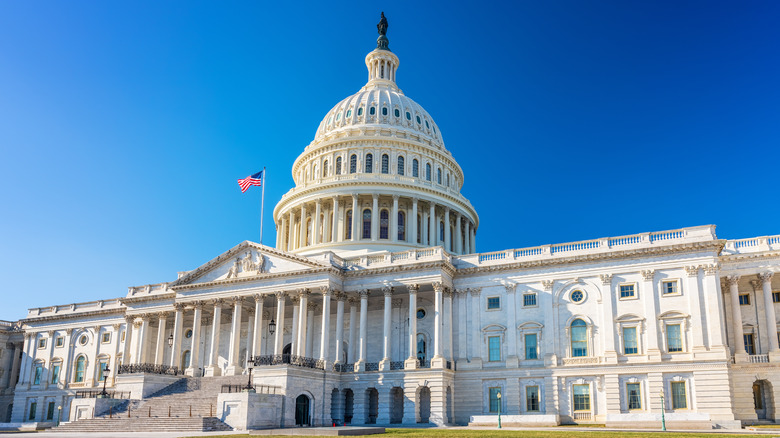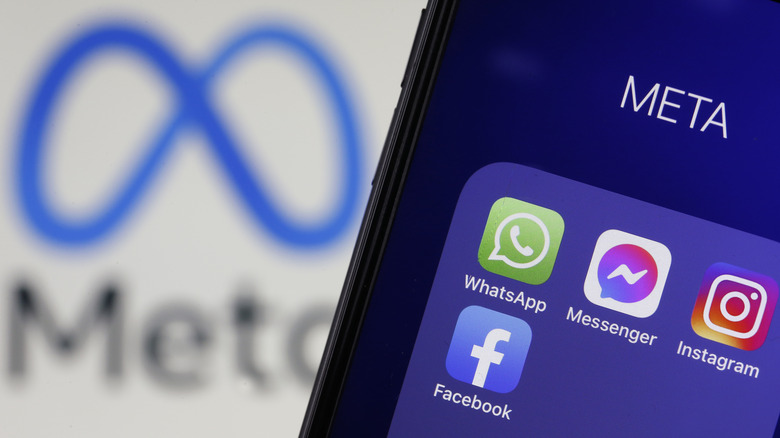Inside The Feud Between Mark Zuckerberg And Elon Musk
Elon Musk turned heads on April 25, 2022, when he purchased Twitter for an extravagant amount of money — $44 billion, as Reuters reports. Musk is the owner of Tesla Motors, The Boring Company, SpaceX, and OpenAI, but when he isn't running his companies, he loves to take to Twitter to air his thoughts (via USA Today). He has sent out lots of tweets on his favorite platform musing on his ideas for the service, like adding an edit button to tweets. And Musk hasn't been shy about criticizing tech giants who came before him. He and Mark Zuckerberg, the owner of Instagram, WhatsApp, and Meta (also known as Facebook), have traded words over their own big ideas for their social media platforms (via Investopedia).
Here are the details behind the multi-year feud between Facebook CEO Mark Zuckerberg, with a net worth of $40 billion, and Elon Musk, the richest man in the world, who has a net worth of $273 billion (per Investopedia).
Two billionaires feud
What could these two tech billionaires have to fight about? As Insider reports, it seems like Musk and Zuckerberg's longstanding feud started around 2016. SpaceX, one of Musk's business ventures, was all set to launch a rocket into space — and bring one of Zuckerberg's Facebook AMOS-6 satellites along for the ride.
If it worked, Facebook would have been able to provide internet connections across the continent of Africa. But the SpaceX rocket actually exploded instead — and the AMOS-6 satellite was completely destroyed. Zuckerberg expressed his unhappiness about the event on Facebook, of which he is the founder and CEO.
Zuckerberg wrote in a 2016 Facebook post after the rocket launch that he was "deeply disappointed to hear that SpaceX's launch failure destroyed our satellite," since it could have improved communications across the entirety of Africa. Then, in 2017, Musk and Zuckerberg traded barbs over artificial intelligence (AI), as Gadgets360 reports.
Squabble over AI
Musk painted a potentially terrifying future of AI, saying he had seen advanced versions that worried him, per Gadgets360. And, he said, he thought people would remain unconcerned about AI until it someday becomes a killing machine.
Per Axios, Zuckerberg replied back to Musk indirectly during a Facebook Live session, saying, "I think people who are naysayers and try to drum up these doomsday scenarios — I just, I don't understand it. It's really negative and in some ways, I actually think it is pretty irresponsible."
Musk didn't take this criticism lying down: he wrote back on Twitter that he and Zuckerberg had discussed it. "I've talked to Mark [Zuckerberg] about this. His understanding of the subject is limited," Musk tweeted out.
On the morning of March 23, 2018, Musk went on a tweetstorm; he first replied to a user who wrote to Musk, "Delete SpaceX page on Facebook if you're the man?" (per Twitter).
The March 2018 tweetstorm
Elon Musk replied seven minutes later, saying he didn't know there was a Facebook page for the brand — and affirming it would be deleted (via Twitter).
As he continued the March 23, 2018 tweetstorm, a Twitter user reminded followers of the 2016 SpaceX rocket explosion. In a tweet, the user described it as when "@elonmusk blew up Mark Zuckerberg's satellite." Musk apparently saw the post, and tweeted in reply, "Yeah, my fault for being an idiot. We did give them a free launch to make up for it and I think they had some insurance."
Musk continued to post about Facebook on Twitter on March 23. He replied to a Twitter post showing a screengrab of the Tesla Facebook page, with the user suggesting the Tesla Facebook page be deleted. Musk replied to that, writing that the Tesla page "looks lame anyway" around 12:15 p.m.
Musk's companies exit Facebook
Notorious for his trolling approach to Twitter, Elon Musk appeared to not know that his own companies were active on Facebook at all (via Gadgets360). But sure enough, during Musk's tweetstorm, according to The Verge, the Facebook pages for both Tesla and SpaceX were deleted.
The next day, Musk responded to another post that two of his companies, Tesla and SpaceX, were leaving Facebook for good, writing in a tweet that the move was nonpolitical. He added, "I didn't do this because someone dared me to do it. Just don't like Facebook. Gives me the willies. Sorry."
And in February 2020, Musk got fired up on Twitter again, when he wrote, "#DeleteFacebook It's lame." He was replying to a tweet that criticized Zuckerberg's control over Facebook and therefore, its supposed control over its 2.5 billion users. In May 2020, he simply tweeted, "Facebook sucks."
Facebook and the Capitol riot
On January 6, 2021, on the day of the Capitol riots, Musk was once again tweeting (via Insider). He generated buzz with a meme (via Twitter) that seemed to reference Facebook's start as a website to rate women by their looks. The meme suggested that the creation of Facebook caused a domino effect, eventually leading to the riot at the U.S. Capital building, where the political process of certifying the U.S. Presidential election was violently interrupted (via Insider).
In 2021, Musk got creative with his meme tweets, using them to poke fun at Zuckerberg directly on Twitter. He was replying to a tweet about WhatsApp making their users share their data to Facebook, a new mandatory rule. In the meme, a boy says to Zuckerberg, "My dad told me you're spying on us," to which Zuckerberg replies, "He's not your dad".
The fight continues
Just seven minutes later, Musk again tweeted out, "Use Signal," referring to the Signal encrypted messaging app. This was definitely another dig at Zuckerberg, who is the owner of WhatsApp, the widely used international texting service (via Investopedia).
According to Insider, Musk criticized Zuckerberg directly at the TED2022 conference in April, saying, "As for media sort of ownership, I mean, you've got Mark Zuckerberg owning Facebook and Instagram and WhatsApp, and with a share ownership structure that will have Mark Zuckerberg the 14th still controlling those entities. Like, literally. We won't have that at Twitter."
The audience laughed along at the joke comparing Zuckerberg to King Louis XIV, who was the longtime ruler of France (via Insider). Since Zuckerberg holds more than 50% of Facebook's voting shares, he basically has complete veto power over the company's decision-making.
Regardless of the ongoing feud, Musk wrote on Twitter after buying the platform in April 2022, "I hope that even my worst critics remain on Twitter, because that is what free speech means".
